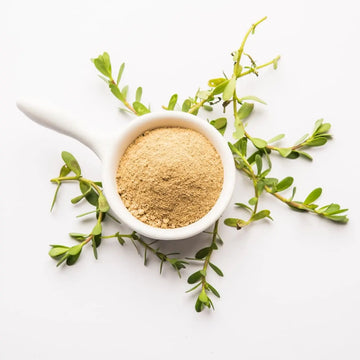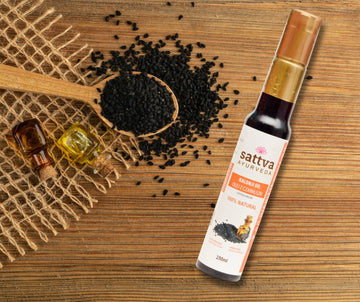Black cumin oil: culinary, health and care properties
Black cumin oil is a natural product that is becoming increasingly popular due to its numerous health-promoting properties. In this article, we will take a closer look at this valuable oil, discussing its extraction, ingredients, medicinal properties, use in cooking, cosmetics and dietary supplementation, as well as quality and storage.
How is black cumin oil made?
Black cumin oil is a vegetable fat obtained from the seeds of black cumin (Nigella sativa), a plant of the buttercup family. This oil is characterized by a dark green color, an intense, spicy taste and a specific aroma. Black cumin is grown mainly in the countries of the Mediterranean basin, the Middle East and South Asia, and its seeds and oil are used in both medicine and cooking.
Obtaining black cumin oil : cold pressing process
Unlike other methods of obtaining oil, such as chemical extraction or refining, cold pressing does not require the use of high temperatures or solvents, which minimizes the risk of losing valuable ingredients and the formation of unfavorable chemical compounds.
Black cumin oil ingredients: thymoquinone, fatty acids and others
Black cumin oil contains a number of valuable ingredients that contribute to its health-promoting properties. The most important of them is thymoquinone – a compound with strong antioxidant, antibacterial and anticancer properties. In addition, black cumin contains fatty acids such as linoleic acid (omega-6) and oleic acid in black cumin oil (omega-9), which have a beneficial effect on the cardiovascular system, skin and hair. Other ingredients of black cumin oil include vitamins (mainly vitamin E), minerals, proteins, flavonoids and phytosterols.

Health-promoting properties
The health-promoting properties of black cumin oil are widely appreciated due to its richness in biologically active ingredients that contribute to improved health and well-being. In recent years, numerous scientific studies have confirmed these benefits, which has contributed to the growing popularity of this oil as a dietary supplement.
Medicinal properties: from antioxidants to analgesics
The healing properties of black cumin oil primarily include its antioxidant effect, which results from the presence of thymoquinone. The antioxidant properties of black cumin oil help neutralize free radicals that can lead to cell damage and accelerate the aging process of the body. In addition, black cumin oil has antibacterial and analgesic properties, which means it can be used as a natural painkiller and anti-inflammatory.
The beneficial effects of black cumin oil on the immune system
The immune system and black seed oil is another aspect worth considering. Black seed oil has immunomodulatory effects, which means it can affect the regulation of the body's immune response. Thanks to this, the oil for immunity can support the immune system in fighting infections, and also contribute to strengthening immunity in the long run.
Black cumin oil in the prevention and treatment of diseases: from allergies to diabetes
Using black seed oil as a preventative measure can provide many health benefits. Its anti-allergic properties mean that this oil can help alleviate allergy symptoms, such as hay fever and asthma. Additionally, black seed oil can be used as a diabetic oil, as studies have shown that it can help regulate blood sugar levels. Finally, black seed oil can lower blood pressure, making it a helpful blood pressure oil for people with high blood pressure.
Application of black cumin oil
The use of black seed oil is very broad, including cooking, cosmetics, and dietary supplementation. In the following sections, we will discuss these three main areas of use of black seed oil.
- in the kitchen: taste, nutritional value and kitchen use
Nigella Sattva oil is characterized by an intense, spicy taste and a characteristic, unique aroma. It is most often added to salads, sauces, but it also works well as an ingredient in marinades for meat or fish. It is better to use it in moderation, because the taste is intense and it is easy to overdo it.
- in cosmetics: cosmetic use for skin and hair
Black cumin oil also has valuable cosmetic properties. The oil moisturizes the skin, prevents dryness and flaking, and can also help fight acne thanks to its antibacterial properties. The oil for hair, on the other hand, strengthens the hair, prevents breakage and split ends, and can also help accelerate hair growth.
- as a dietary supplement: what dose?
Black seed oil as a dietary supplement can bring many health benefits, which we have mentioned in the previous sections. To reap these benefits, it is worth using the oil in drinking in the right dose. It is recommended to take black seed oil in the amount of 1-2 teaspoons daily, preferably before a meal. Regular consumption of black seed oil can help improve immunity, skin and hair health, and also support health prevention and building immunity.
Quality of black cumin oil
Of all aspects, however, the key is the quality of the product.
Unrefined Black Seed Oil vs. Refined Oil
Unrefined black cumin oil is one that has not undergone refining processes such as purification, bleaching or deodorization. Thanks to this, the natural oil retains its valuable nutritional properties, such as vitamins, minerals and antioxidants. Compared to refined oil, unrefined black cumin oil has a more intense taste and smell, as well as a darker color. Refined oil may lack some nutritional values, but it has a longer shelf life and is more resistant to oxidation. In the context of health, it is definitely worth choosing unrefined black cumin oil.
The Difference Between Cold Pressed Black Seed Oil and Black Seed Oil
It is worth noting the difference between cold-pressed black cumin oil and black cumin oil. Cold-pressed oil is a vegetable fat obtained from seeds, while black cumin oil is a plant essence obtained through steam distillation of black cumin flowers and leaves. Steam-distilled oil contains different ingredients than cold-pressed oil from seeds, and its uses and health effects may differ. It is important to read the label carefully to know what product you are dealing with and make the right choices.
Storing Black Seed Oil: How to Ensure Long-Term Freshness and Preserve Properties?
Storing black cumin oil is important to maintain its quality and properties. To ensure long-term freshness of the oil, store it in a tightly closed, dark glass container, away from light and heat sources. The ideal storage temperature is 15-20°C. Avoid storing the oil in the refrigerator, as this can cause it to thicken and lose its properties. Also, remember to use the oil within a few months of opening, as it can lose its nutritional and health benefits over time.



